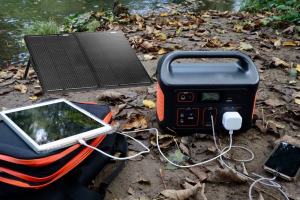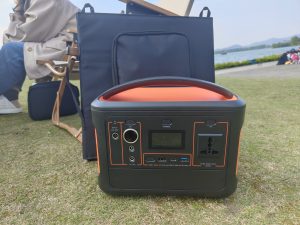More
Unleashing Power: Pros and Cons of Advanced Battery Chemistry in Portable Power Stations
Unleashing Power: Pros and Cons of Advanced Battery Chemistry in Portable Power Stations
Introduction:
Outdoor power stations have become essential companions for adventurers and outdoor enthusiasts, providing a reliable source of electricity in remote locations and during emergencies. One of the key factors influencing the performance of these power stations is the battery chemistry they utilize. Advanced battery chemistry, including lithium iron phosphate (LiFePO4), nickel-metal hydride (NiMH), and solid-state batteries, has revolutionized the portable power industry, offering various benefits over traditional battery types. In this blog post, we will explore the advantages and disadvantages of advanced battery chemistry in outdoor power stations, unlocking their potential to elevate your outdoor experiences.
Advantages of Advanced Battery Chemistry for Outdoor Power Stations:
-
Higher Energy Density:
Advanced battery chemistries, such as lithium iron phosphate and solid-state batteries, boast higher energy densities than traditional lead-acid batteries. This translates to increased power capacity, allowing outdoor power stations to store more energy in a compact and lightweight form, making them ideal for portability.
-
Longer Battery Life:
Advanced battery chemistry generally provides longer battery life and a higher number of charge-discharge cycles compared to traditional batteries. This means your outdoor power station will last longer, providing reliable power for extended periods during your adventures.
-
Rapid Charging:
Advanced battery chemistry supports faster charging rates, significantly reducing the time required to recharge your outdoor power station. This feature is particularly useful during outdoor trips, where quick charging allows you to get back to your activities without waiting for the battery to fully charge.
-
Lightweight and Compact Design:
The higher energy density of advanced battery chemistry allows for a more lightweight and compact design in outdoor power stations. This makes them easier to carry during hiking, camping, or other outdoor activities where portability is essential.
-
Environmentally Friendly:
Some advanced battery chemistries, like lithium iron phosphate and solid-state batteries, are more environmentally friendly compared to traditional lead-acid batteries. They produce fewer toxic byproducts and are recyclable, contributing to a cleaner and greener approach to outdoor power solutions.
Disadvantages of Advanced Battery Chemistry for Outdoor Power Stations:
-
Cost:
Advanced battery chemistries tend to be more expensive than traditional batteries, resulting in higher upfront costs for outdoor power stations. However, the longer lifespan and superior performance often justify the initial investment for frequent outdoor enthusiasts.
-
Safety Concerns:
While advanced battery chemistries are generally safe, improper use or manufacturing defects can lead to potential hazards, including overheating or fire. It is crucial to use high-quality batteries from reputable manufacturers and follow proper charging and storage procedures to ensure safe operation.
-
Limited Availability:
Compared to traditional battery types, advanced battery chemistry options may have limited availability in some regions. This can impact the choices of outdoor power stations available to consumers, particularly in certain markets.
-
Limited Temperature Tolerance:
Certain advanced battery chemistries, like lithium iron phosphate, can experience reduced performance in extreme temperatures. Extremely cold conditions may cause temporary reduction in capacity, while high temperatures can lead to accelerated degradation over time.
Conclusion:
Advanced battery chemistry has ushered in a new era of efficiency and performance for outdoor power stations. With higher energy density, longer battery life, rapid charging, and a lightweight design, advanced batteries offer numerous benefits for outdoor enthusiasts seeking reliable power solutions. Despite the higher upfront costs and potential safety concerns, the advantages of advanced battery chemistry far outweigh the disadvantages. As outdoor power stations continue to evolve, embracing advanced battery technologies will empower you to explore the great outdoors with confidence, ensuring you stay connected, powered, and ready for the most unforgettable adventures.















